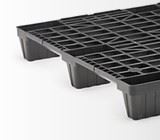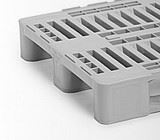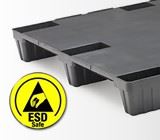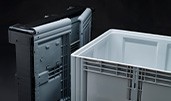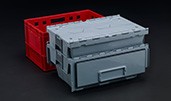To comply with safety and hygiene regulations in the food industry and more specifically in the meat and poultry sector, is undoubtedly the highest priority and concern of any related company. As these are environments in which food is handled daily, the cleaning conditions must be very strict and must always comply with the legislation required by the HACCP and European directive to guarantee proper hygiene practices, when transporting and receiving raw materials as well as caring that the facilities, structures and existing furniture are in in good conditions among other points.
Some hygiene regulations in the food sector
Considering that the regulations involve, among other requirements, that:
- The food is placed on a raised structure 25 cm from the ground.
- Structures must be washable, anti-porous, in a waterproof material and resistant to deterioration and breakage. This makes plastic pallets the perfect logistic solution for companies in the sector, as it is an extremely hygienic and safe element that does not allow liquids to penetrate or that bacteria or parasites nest which could accidentally contaminate processed foods.
In the meat and poultry industry, as it is a highly regulated market with very demanding quality standards when it comes to handling processed materials, it is essential to guarantee a hygienic environment that meets certain conditions of safety, sanitation and cleanliness, such as it’s reflected in the Royal Decree 179/1985 published in the OSG, regarding the Technical-Sanitary Regulation of Poultry Slaughterhouses, Cutting Rooms, Industrialization, Storage, Conservation, Distribution and Marketing of their Meats. Therefore, considering the regulation, plastic pallets are a perfect element for transport and reception of goods, preferable to wood. In a previous article we explained the differences between one and the other. Next, we remind you some.
The main advantages of plastic pallets
- To indicate some of its many advantages, plastic is:
- A waterproof, hygienic and antibacterial material. So, its use is highly recommended for humid environments or the ones with direct contact with water. It avoids any type of contamination.
- Easy to wash. It is an easy and fast cleaning material.
- With high durability. It is due to its great resistance to breakage or deformation, something that does not happen with wood, a very porous material that does not stand well time.
- Cost reduction: the nestability of certain products, means that more units can be transported in a truck and occupies less space which reduces storage and transport costs. In addition, at the end of the life cycle of the plastic pallet, the customer can recover part of the initial investment thanks to their recyclability.
Types of plastic pallets
Being one of the sectors where the plastic pallet is more widespread, as a result of the strong measures of hygiene and food safety, in general, two types of pallets are used in the meat industry, according to the logistical use attributed to it:
- Captive pallets. This means, that it’s used exclusively in the inside of warehouse and processing plants. In this case, many companies in the sector choose the HYGIENIC range from Naeco for its high durability, among other benefits. One of the most commercialized pallets is the H1 pallet, a European standard. -
- Pallets for product delivery. At the time of delivering the finished product to the distributor or retailer, many producers opt for the BASIC range pallets (called lightweight or "single use"), especially when recuperating the pallets is complicated or when you want to export products.
Conclusion
It is demonstrated, that to ensure the highest quality of hygiene and sanitation in the food sector in general and in meat and poultry, the most recommended logistics solution for transporting perishable and sensitive products is plastic pallets because beside being more resistant and cleaner, they are made of recyclable and reusable materials, and in many cases 100% ecological. Which means that besides being very safe elements, they take care of and protect our environment.

